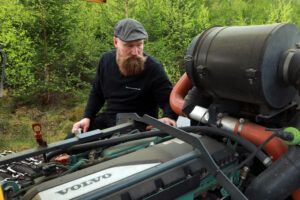Swedish OEM Eco Log helped put the very first Volvo Penta engine in a forestry utility. A decade later, this Volvo Penta D8 Stage IV engine continues to be operating and the 1,000th Volvo Penta-powered Eco Log machine has been delivered.
Virtually 10 years in the past, the primary Eco Log 580E Harvester was fitted with the primary Volvo Penta engine ever put in in a forestry utility and offered to Swedish forestry specialists Nitta Rundvirke AB. In 2024, when Nitta Rundvirke ordered one other harvester, the Eco Log 590G with the newest D8 EU Stage V Volvo Penta engine, the sale marked a brand new milestone within the corporations’ long-standing relationship, in addition to the supply of the 1,000th Eco Log machine powered by Volvo Penta.
Frans Spetz is likely one of the co-owners of Nitta Rundvirke, positioned in western Sweden. Based in 1965, the family-owned firm operates in a number of industries, together with transportation, excavation, and forestry. Along with operating his firm, Spetz conducts lots of area assessments.

Intensive testing in demanding work environments, mixed with an ongoing dialogue on enhancements, is important for locating the most effective options. By working in shut collaboration with prospects, Volvo Penta develops services that meet ever-increasing calls for by way of productiveness, cost-efficiency, connectivity, and sustainability. With Nitta Rundvirke, new engines and machines are examined in varied forestry purposes, of their correct work atmosphere.
“As area testers, we’re sincere and easy all through the event course of,” says Spetz. “There are different area testers which might be simply pleased to attempt one thing new, with out giving correct suggestions or telling the producer what they really suppose. However we all the time do.”
Among the many machines that the operators of Nitta Rundvirke work with, and have examined completely, are these of Swedish OEM Eco Log, geared up with Volvo Penta industrial engines. Spetz purchased his first Eco Log 580E Harvester virtually 10 years in the past, outfitted with the very first Volvo Penta engine ever put in in a forestry utility. Greater than 11,000 work hours later, that D8 Stage IV engine continues to be operating right this moment, in the identical harvester, with solely routine upkeep since its set up.
When a forestry machine malfunctions in a distant location, the operator will typically have to unravel the difficulty on the spot. To maintain pricey downtime to a minimal, they should know quite a bit about their machines and their engines.
Spetz and his colleagues use their machines to their most capability. Even so, the D8 engine has remained strong and dependable 12 months after 12 months.
“We needed to change the water pump sooner or later,” Spetz notes. “However that’s the form of inevitable upkeep that comes from regular put on and tear.”
Forestry machines are very advanced, and operators demand quite a bit from them. Nevertheless, the development of each the machines and their engines must be intuitive and handy, to facilitate upkeep when required.
“Once you dimension every thing accurately, and the engine is simple to work with, it simply makes every thing quite a bit simpler,” Spetz says, including that one of many causes many gamers within the forestry business select Eco Log’s machines as a result of they’re geared up with Volvo Penta engines.
Within the spring of 2024, Spetz ordered yet one more harvester, the Eco Log 590G, geared up with the newest D8 EU Stage V Volvo Penta engine. Shortly afterwards, he noticed a video acknowledging the supply of the 1,000th Eco Log machine powered by Volvo Penta.
“There was a clip highlighting the event, displaying Volvo Penta coworkers displaying an engine with a shiny, gold-coloured engine cowl, which I assumed regarded very nice,” says Spetz.
When Spetz met with Eco Log and Volvo Penta to obtain his new harvester, he was greeted by an unusually nice variety of folks out within the forest.
“They’d introduced cake and stuff, and there – below the hood of my new harvester – was the engine with the golden cowl.”
“The engines simply maintain going, that means that we will maintain going, too,” says Spetz. “No restore wanted, solely occasional routine upkeep. It’s cool to know that the 1,000th engine sits proper there, in our harvester. Not that we get that many alternatives to have a look at it, because it hardly ever ever must be checked.”


